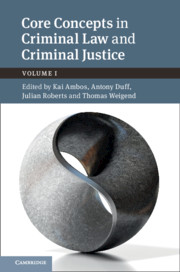Book contents
- Core Concepts in Criminal Law and Criminal Justice
- Core Concepts in Criminal Law and Criminal Justice
- Copyright page
- Contents
- Preface
- Abbreviations
- Contributors
- Part I Introduction
- Part II Criminal Law
- 2 Omissions
- 3 Preparatory Offences
- 4 Participation in Crime
- 5 Consent in the Law Relating to Sexual Offences
- 6 Terrorism Offences
- Part III Criminal Justice and Procedure
- Index
- References
2 - Omissions
from Part II - Criminal Law
Published online by Cambridge University Press: 19 December 2019
- Core Concepts in Criminal Law and Criminal Justice
- Core Concepts in Criminal Law and Criminal Justice
- Copyright page
- Contents
- Preface
- Abbreviations
- Contributors
- Part I Introduction
- Part II Criminal Law
- 2 Omissions
- 3 Preparatory Offences
- 4 Participation in Crime
- 5 Consent in the Law Relating to Sexual Offences
- 6 Terrorism Offences
- Part III Criminal Justice and Procedure
- Index
- References
Summary
From a naturalistic perspective, omission is the opposite of action – it is non-action (not-doing), absence of action. From this perspective, an act or active conduct can be easily identified because of the expenditure of energy it generates, for example, through a bodily movement causing a certain result in the empirical world. In contrast, an omission lacks a physical reality; it does not display any (causal) energy; it is, in this sense, simply non-existent. As a consequence of such a naturalistic approach, it has been argued that omissions cannot actually cause any result and thus cannot have any legal relevance, let alone create criminal liability.
- Type
- Chapter
- Information
- Core Concepts in Criminal Law and Criminal Justice , pp. 17 - 53Publisher: Cambridge University PressPrint publication year: 2020
References
- 1
- Cited by

